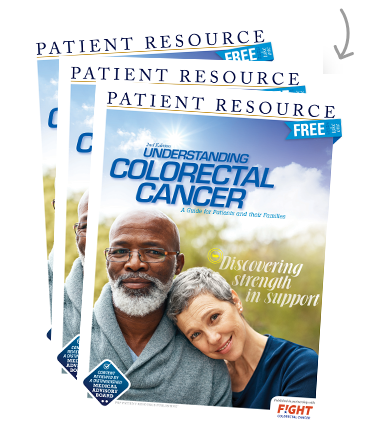Colorectal Cancer
Survivorship

Once you move into survivorship, it is important to continue to be proactive about your health, including making and keeping regular follow-up appointments. Regular monitoring will help your doctor detect warning signs of a recurrence or a second cancer so early treatment is possible. These appointments also give you the opportunity to keep the lines of communication with your doctor open as you transition back into former activities and explore new ones.
Your doctor or nurse will work with you to develop a customized follow-up care plan that may include the following:
- Follow-up appointment schedule for on-going monitoring.
- Maintenance medications or therapies, including type, dosage, frequency and duration.
- Referral(s) for cancer rehabilitation services, such as physical or occupational therapy, a lymphedema specialist or others.
- Information about your risk of a recurrence, a second cancer, long-term treatment-related side effects and late effects.
- Recommended screening guidelines for other types of cancer.
- What you can do to stay healthy.
Follow-Up Doctor Appointments
After treatment is complete, you may see your primary care doctor for follow-up care. How often you see your doctor depends, in part, on the stage of your cancer and its chance of coming back. It also depends on your overall health.
Regular visits are important. Your doctor can take a history, conduct exams and tests, care for any chronic medical conditions, check for signs or symptoms of recurrence and help you better manage any side effects. Continue to keep copies of your medical records. That is especially helpful if you see a new doctor.
Follow-up is most important the first 5 years after treatment. That is when cancer is most likely to return.
If you have no signs of cancer, your doctor may suggest a physical exam and certain tests every 3 to 6 months for 2 years after treatment. Then, you may change to appointments every 6 months or so for the next few years. If you had an early-stage cancer, follow-up may be less frequent. If your cancer has spread (metastasized) or you are diagnosed with hereditary colorectal cancer, talk to your doctor about the plan for follow-up.
Ongoing Monitoring: Tests You May Need
Testing after treatment varies, but your doctor will likely recommend the following:
- A colonoscopy about 1 year after surgery and 3 years later if results are normal. Depending upon your test results, future exams will be less or more frequent but should typically occur every 5 years if normal.
- Protoscopy every 3 to 6 months for 2 years, and then every 6 months for a few years, if a surgeon removed rectal cancer through your anus.
- Imaging tests such as a CT scan every 6 months to a year if you are at high risk for cancer recurrence. If you had tumors in your liver or lungs, you may receive scans more often.
- Blood tests about every 3 to 6 months for 2 years and then every 6 months for a few years. These tests check for substances called biomarkers, which may show up in your blood if you’ve had colorectal cancer. If levels go down with treatment and then go back up after treatment, this may be a sign that cancer has returned.
Guidelines may change if studies show that testing is needed less or more often. Colorectal cancer can run in families. Be sure to have family members get genetic testing to see if they are at higher risk.
Late Effects
After treatment, most side effects go away. In some cases, though, you may have side effects that last a long time or that show up much later. These are called late effects. Discuss any side effects with your health care team, who are dedicated to helping you manage them:
- Chronic diarrhea
- The need to go to the bathroom often
- Trouble holding your stool
- Urinary symptoms
- Numbness or tingling in fingers or toes (neuropathy) from chemotherapy
Health, Wellness and Lifestyle Recommendations
You can take many steps to stay healthy and help prevent the return of cancer:
- Do your best to maintain a healthy weight.
- Get regular physical activity, which may lower your risk of recurrence. Even a 10-minute daily walk can energize you and offer multiple health benefits, such as reducing anxiety, depression and fatigue. Physical activity is also a great way to reduce stress, which is important to your overall health. Before you begin any new exercise program, discuss it with your doctor.
- Eat a balanced diet. Aim for a diet rich in vegetables, fruit, lean meat and fish. Avoid refined sugars, fats and red or processed meats.
- Ask your doctor or dietitian about supplements you may need such as vitamin D or calcium.
- Avoid alcohol, which is linked to an increased risk of colorectal cancer, especially in men.
- If you smoke, quit. Research shows that smokers are more likely to have a worse prognosis than non-smokers.
Pay attention to how you’re feeling mentally and emotionally, and know that support is available — whether from family and friends or more formal support groups and professional counseling. Don’t forget to bring up emotional issues with your doctor, too.



